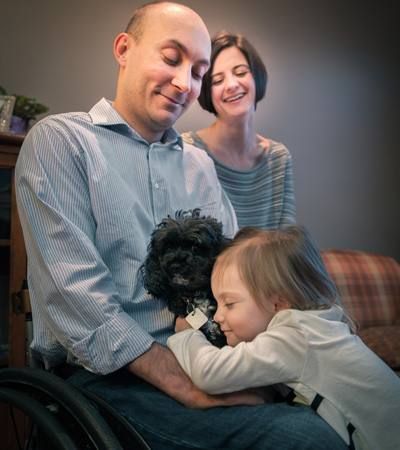
Paul Peer is pictured here with his family. He has lived with spinal cord injury (SCI) since 1995. (Photo: Mark Rideout).
Paul Peer, a thirty-eight year old husband and father, has lived with a spinal cord injury (SCI) since 1995. His injury left him quadriplegic and with secondary health complications that he's worked to manage over the past two decades.
"Living with a spinal cord injury is challenging enough," said Peer. "But being paralyzed also means dealing with complications, like pressure ulcers, factures and cardiovascular problems.
The
Spinal Cord Injury: Manifesto for Change, led by Dr. Cathy Craven, physiatrist, Toronto Rehab, is a call to action and a plea for Canadian health-care providers and stakeholders to work in coordination to address the long-term issues of managing the chronic implications of an SCI.
"I've fractured my leg, and experienced first-hand the perils of osteoporosis at a young age," said Peer. "I'm prone to sudden and potentially dangerous spikes in blood pressure. It can become stressful, trying to lead a 'normal' life while dealing with these problems – or trying to avoid them. And I'm concerned they will get worse as I grow older."
The Manifesto outlines how to address the long-term issues for people living with SCI: secondary health concerns; increased need and utilization of health-care services; and disparate access to care, services and expertise.
Read the media release
here.
Read the
Spinal Cord Injury: Manifesto for Change here
